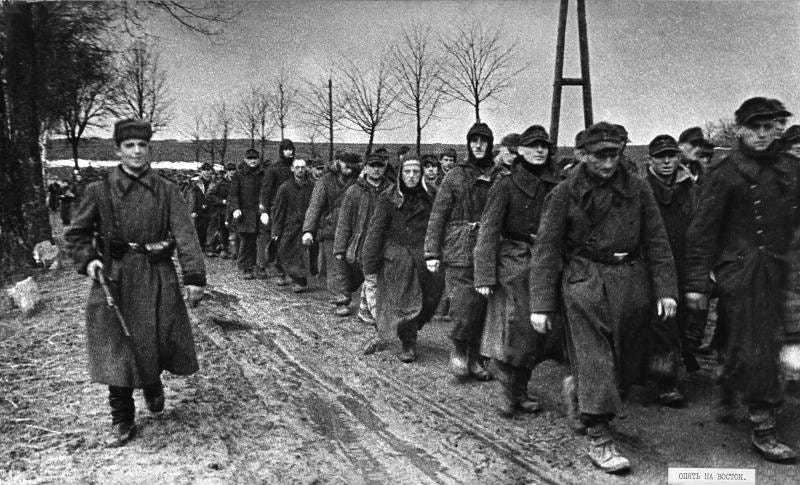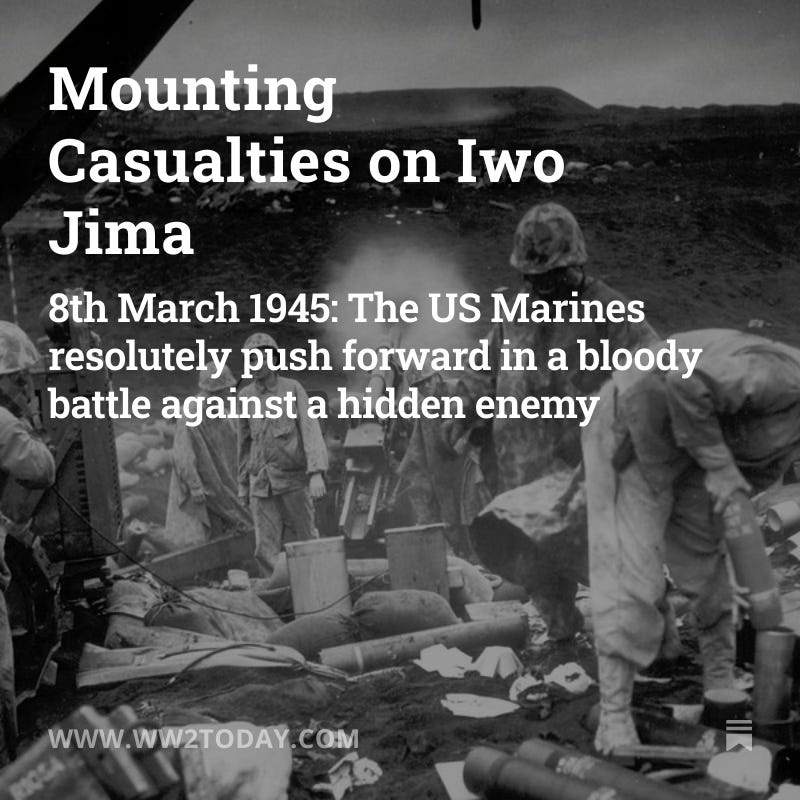'Death March into Russia'
A rare account of a German soldier who survived as a Prisoner of War of the Russians
Around three million Germans were taken prisoner by the Red Army during the war. A third of them died in the brutal conditions of the Soviet work camps. The last prisoners were only released in 1956, over a decade after the end of the war. This casualty rate was actually more favourable than the numbers of Russians and other Soviet nationalities who died in Nazi captivity.
Not many of those who returned home wanted to talk about their experiences. Klaus Willman managed to persuade one man to speak at length, and the result was Death March into Russia: The Memoir of Lothar Herrmann, first published in Germany in 2017 and in English in 2019. This is a vivid and immediate account of the terrible suffering endured by the Germans who fell into the hands of the Soviets. Herrman tells the story of a relatively typical German male born in 1920 - who almost inevitably found himself dragged into the Nazi war machine.
He was captured when the Romanians switched sides in 1944, and his Wehrmacht unit was taken prisoner by surprise. They were then handed over to the Russians. By the end of the year, Herrman was in a bad state:
We had no choice but to get used to our new circumstances, even to the repetitious inquisitions. After I had a few tense hours of being questioned, it turned out that I actually got away rather lightly, because neither my unit nor therefore myself had been guilty of any war crimes and thus no blame for anything untoward could be pinned on us. But others didn’t fare that well and quite a few disappeared, never to be seen again. Rumour had it that the crime must have been the slaughtering of a cow or a pig, that in other words the perpetrator had appropriated state property. Reason enough to cart him off to Siberia.
Many of us lost a frightening amount of weight in a very short time and it happened ever more frequently that one or two from our group would have to be carried away before our shift had even started. I too had to tighten the string around my waist repeatedly. But I never failed to remind and admonish myself: ‘Lothar, you must persevere, you must hold on and survive and don’t pay any attention to your constantly grumbling stomach. You must overcome the hunger, because the mountains in the Loisach valley are expecting you.’
Then there was the first victim of a new scourge. Shortly before Christmas a guy shouted to nobody in particular: ‘Move out of my way, I can’t hold it in any longer!’ He staggered towards the standing latrine some twenty or thirty metres away from him, and even before he could reach it we could see his bottom turning bright red. Our school principal, as usual knowing the score, warned me that the poor chap was suffering from dysentery. ‘That’s all we needed,’ he added in exasperation. The following day the fellow’s emaciated corpse was discarded.
The ensuing weeks, with two or three or even more dead every few days, only dispirited us further. At one point I overheard a natchalnik comment sarcastically: ‘Now you Nazis know how is when man shits himself dead. Like this, you so many of us killed.’
This is how we vegetated from one day to the next, from one tiny ration to another, like animals, and having lost all sense of time. It was only when we were allocated to a different shift that we became aware that yet a further seven days had elapsed. Once, we had just finished our night shift and had collapsed dead-tired onto our planks, someone asked half-heartedly: ‘Christmas ... has it come and gone already?’ The response he received sounded angry: ‘Dream on, man, do we really give a damn? I count myself lucky if I can keep myself upright on these hunger rations!’
Only our school principal seemed to have the wherewithal to care about other things, things beyond our malnutrition. Still of strong voice he declared: ‘Christmas 1944 has just passed. The Orthodox Christians celebrate the holiday on 6 January. But because the Communists refuse to tolerate any kind of religion, the Christians and their priests are now obliged to perform their services in secret. What’s important at this moment is for you to conserve your strength and get some sleep.
It was an icy day in January when it was my turn to be asked whether I wanted to bury a guy. There was an extra portion of soup in it.
The school principal, shooting me a glance, was prepared to help me, and so together we lugged the cadaver outside. A guard pointed us in the direction of a yard filled with rubble, located just behind the pit. There was nothing, of course, in the form of a burial. The ground was frozen solid. The two of us were chilled to the bone, but did our best to remove some hard clots of soil and stone with our clammy fingers before chucking our corpse to join the heap of others already piled there. We then covered the bodies with some debris and chunks of clay. Only God could know what spring would bring. The wind tore at our clothes and with the job done we hurried to get ourselves back to the sheltered side of the unheated hall.
Towards the end of February, I too showed symptoms of having contracted dysentery and was moved to the sick bay, fortunately in a heated space which was therefore more bearable. I was actually pleasantly taken by the friendly manner of the female doctor whose maternal approach had a soothing effect on me. At the very start of my therapy she ordered that I first get myself cleaned up thoroughly, and a former German medic scrubbed me from head to toe; sadly he didn’t allow me to remain sitting in the warm water of the tub any longer than was necessary. ‘Man, we don’t really usually have that much warm water here,’ he said.
Before being allowed to wrap up in a blanket and lie down on a plank, I even got a portion of soup, which I devoured instantly. This one was more nutritious than what we received as our daily ration after our shifts, and it was even supplemented by a piece of white bread. All in all, I nearly felt well within myself. There were some further twenty patients spread out on the wooden floor alongside the brick walls.
Many died and were carted away, others recovered, and others still were immediately dispatched back to work. After about a fortnight the doctor assigned me to labour category three, which translated as me being sufficiently fit to work, but only for lighter labour in section ten.
As I was making my way to my new assignment, the rays of early spring lingered on our dismal surroundings, warming me up. But the sun seemed to shine right through me into my heart, and all I could do was fervently hope that this miserable war would soon come to a close. Maybe, just maybe, those miracle weapons that had been promised to us would turn the tide and again bring good fortune to Germany. All I really cared about was seeing my beloved mountains once more.
Hope surged and was further boosted by the fact that some days prior I had been given permission to go to the camp’s shoe workshop where our cobbler had been working. I was able to get my totally worn-out clogs replaced by a pair that themselves had been mended several times already, but were quite handsome things compared to the old pair. And what joy when I also received some old but still usable footwraps. Thus equipped, I marched towards my newly allocated post and felt as if I was being carried on wings.
Following my orders I reported to the natchalnik of section ten, a man quite similar to my previous superior. With a few words he assigned me to a charge-hand, a German, much to my surprise. ‘Here in my work squad we always unfailingly meet our production target. This is not a place to recuperate.’ Those were his welcoming words, and he continued: ‘Daily deliveries of empty gun crates come in from the front, more or less damaged stuff. Our duty is to put them back in working order as best we can. So, off with you! Get to work! Otherwise they’ll cut our bread ration.’
© Klaus Willman 2019, 'Death March into Russia: The Memoir of Lothar Herrmann,'. Reproduced courtesy of Pen & Sword Publishers Ltd.





